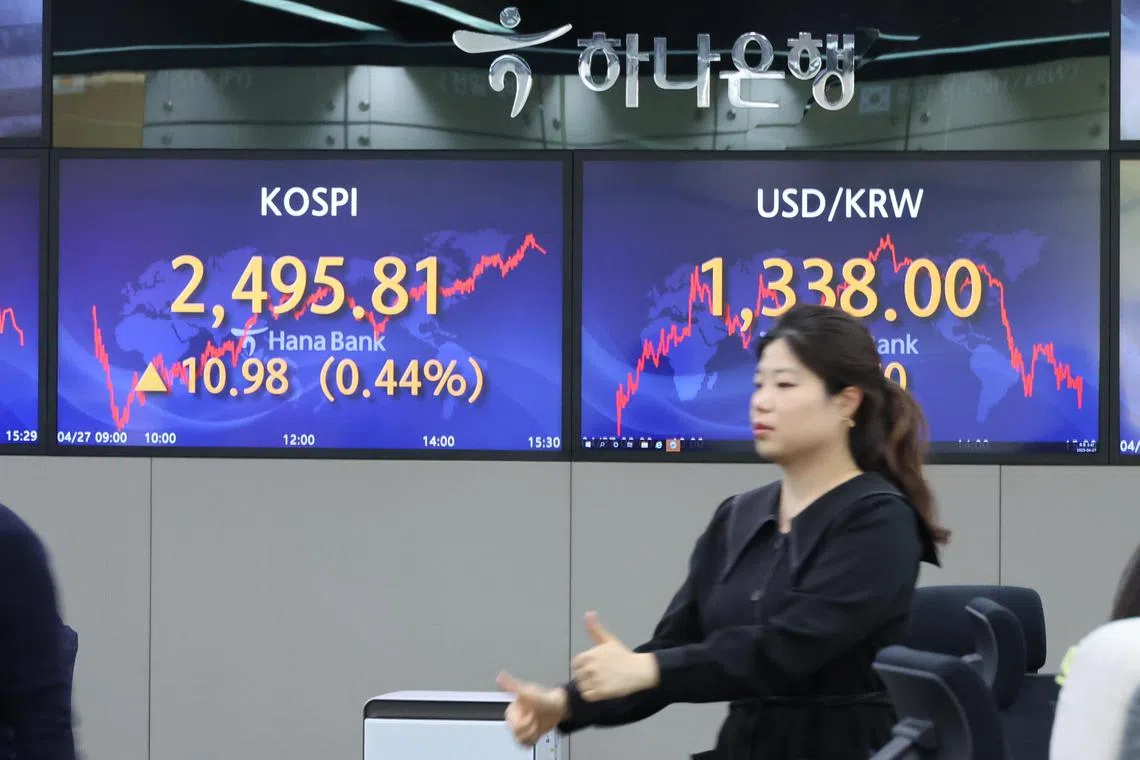South Korean bonds to lure more investors amid rate cut bets
Sign up now: Get ST's newsletters delivered to your inbox

Offshore markets have already scooped up a net $18.44 billion of South Korean bonds in 2023.
PHOTO: EPA-EFE
SEOUL – Foreign investors are likely to keep flocking into South Korean bonds as cooling inflation combined with growing concerns over the nation’s key tech sector pressure the Bank of Korea (BOK) to start easing policy as early as 2023.
Offshore markets have already scooped up a net US$13.8 billion (S$18.4 billion) of South Korean bonds in 2023, outstripping inflows into any other Asian country tracked by Bloomberg.
The funds purchased the nation’s debt for 35 straight days through March 6 to April 21, marking the longest streak of net buying since July 2021.
South Korean trade and consumer price index print due this week may fuel bets of an interest rate cut in the latter half of 2023, following data that showed inflation eased more than forecast in March.
Expectations for FTSE Russell to add South Korean bonds to its flagship bond index as early as September are also adding to the market optimism.
“South Korea was among the first to hold rates this year, after starting to hike ahead of most other central banks – meaning it could be the first to pivot too,” said Mr Ahn Jae-kyun, a fixed income analyst at Shinhan Investment, who expects the BOK to start cutting rates in October.
Growth trend looks weaker compared with the rest of the world, and the currency is deemed excessively weak, which explains the deluge of inflows, Mr Ahn said.
Despite the bond inflows, the South Korean won – likely weighed by seasonal dividend-related outflows and weak trade – has dropped more than 6.2 per cent against the US dollar in 2023 and is the worst-performing currency in Asia.
Analysts are expecting the won to strengthen to an average of around 1,230 per US dollar by year-end, according to an average forecast in a Bloomberg survey. It closed at 1,339.03 on Friday.
As South Korea’s crucial chip sector slows down, analysts have consistently wagered for rate cuts in 2023, with Nomura predicting as many as three cuts.
South Korea has been buffeted by a six-month drop in exports marked by a record trade deficit in January amid falling semiconductor prices. Lurking credit worries linked to the nation’s shaky housing market and growing tensions between the United States and China – South Korea’s two largest trading partners – have also added to risks.
“There is a chance for credit risks to burst out again with a number of real estate project financing loan expirations concentrated in the first half of the year,” said IBK Securities fixed income analyst Kwon Keejoong, who expects foreign bond inflows to continue this quarter ahead of an anticipated rate cut at the end of 2023. BLOOMBERG


